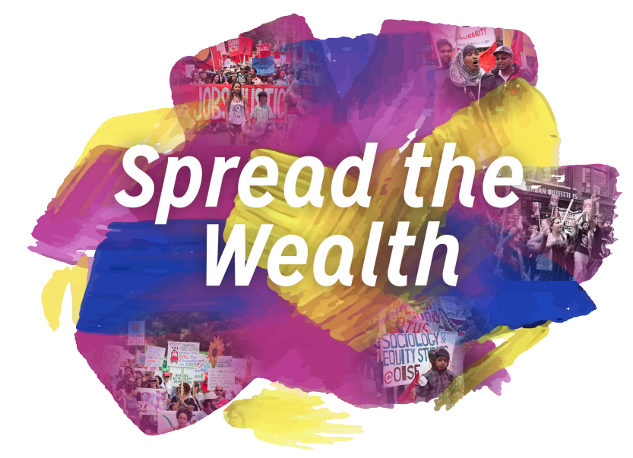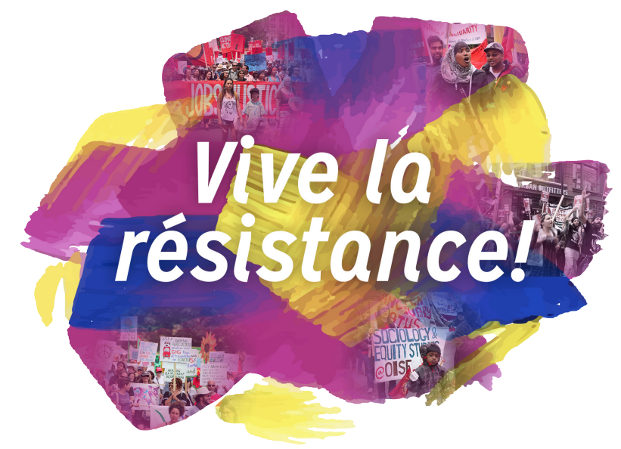A community trust formed in 2011, Groundswell Community Justice Trust Fund began as a way to talk about funding social movements, while building a capital base to benefit social justice organizing over the long term. We came together to talk about money and personal wealth, and to encourage people with extra money who believe in grassroots social change to get serious about funding movements in Ontario and beyond. Our hope is to create a practice of consistently and dependably funding social movements by getting people to look at their finances and contribute what they can on a monthly or yearly basis. Our ultimate goal is not to generate more money for Groundswell, but to get more cash flowing for transformative social change. At a time when capitalism is in crisis, and inequality and exploitation flourish, we are trying to t ake a practical approach to building a better future. Groundswell is trying to breathe some life into a conversation about money, and help grow left social movements that are independent and resourceful.
ake a practical approach to building a better future. Groundswell is trying to breathe some life into a conversation about money, and help grow left social movements that are independent and resourceful.
Neither the United Way nor the NDP
Canadians give away money. Statistics Canada charted charitable giving by Canadians in 2010 and found that 84% of Canadians donate to a charity or non-profit organization, amounting to $10.6 billion in total donations. The average annual amount per donor was about $450, while people who were religiously active gave an average of $1,000 per year. Religious groups received the largest portion of these donations, capturing 40%, followed by the health sector which received 15%, and social service organizations which received 11%.
Perhaps even more telling are the amount of donations made to political parties. The Canadian Press analyzed donations by Canadians to political parties between 2007 and 2010, illustrating how the “big three” political parties in Canada raise millions of dollars every year through individual donations. While the maximum an individual can give to a party each year is $1,100, only a minority of donors give such large amounts. In fact, most donors give less than $200 each. Between 2007 and 2010, 331,000 individual donors, who gave less than $200 each, raised $32 million for the Conservative Party. For the Liberal Party, 93,000 donors raised $8 million, and 74,000 donors raised $7 million for the NDP, all of whom gave less than $200 each. The average donation to the Conservative Party was just $120.
People in this country are invested enough in politics to give millions of dollars every year to mainstream political parties. Those of us who don’t believe that electoral politics is the best way to effect change, need to encourage eac h other to donate consistently to the community and political organizations that we support. This way we will have greater potential to become a force to challenge political parties that hold office.
h other to donate consistently to the community and political organizations that we support. This way we will have greater potential to become a force to challenge political parties that hold office.
How Rich are You?
It’s almost ridiculous to rail against consumer culture and the social pressure to use our money to buy things that will make us happier, make our lives more convenient, or provide us with more time. We are living under modern capitalism and are lured by its pleasures to varying degrees and with varying abilities. For those with extra to spend, it is important to consider how much is “enough,” and what could be done if that money was pooled to help build organizations that could actually improve people’s lives.
If you start talking about money with the people around you, you might get a sense of where you stand. In the meantime, here’s what the statistics show: In 2011, Stats Canada numbers show the richest 10% of Canadians earned more than $80,400 a year. The median income for individuals was $27,600, while for families it was $76,000, meaning that half of all Canadians earned more than that, and half earned less. The average income in Canada was just $38,700. Most importantly, the top 40% of earners account for 89% of the total national net worth, leaving the bottom 60% with just 11%. Of course, it is no surprise that, in terms of wealth, Canada is a divided society, and that many people and families are not making ends meet. But for people who aren’t struggling, it might actually be true that you are richer than you think, and that there might be a place in your budget to donate some more money to the groups you support.
Powerful Movements
We need to fund our movements and build lasting infrastructure to support new visions for our society. Knowing that people give so much money to political parties and charitable organizations is encouraging – people want to support the causes they believe in and engage with politics. But if your vision is to transform society and fight systemic injustice, political parties and charities will not fulfill those goals. For people who have little faith in the Canadian electoral system, and don’t believe that charity brings justice, funding grassroots organizing is a  way to engage politically with our society. Grassroots organizing creates space for effected people to join together, assert their rights, demand justice, and become agents in their own political existence.
way to engage politically with our society. Grassroots organizing creates space for effected people to join together, assert their rights, demand justice, and become agents in their own political existence.
Groundswell wants to start talking about how to generate more money for social justice movements by encouraging individuals to donate a portion of their extra capital on a consistent basis. A large number of small donations, combined with large donations from wealthier individuals, have the potential to fund old and new organizations and projects, build infrastructure for organizing in the long term, and create new avenues to discuss and disseminate political ideas.